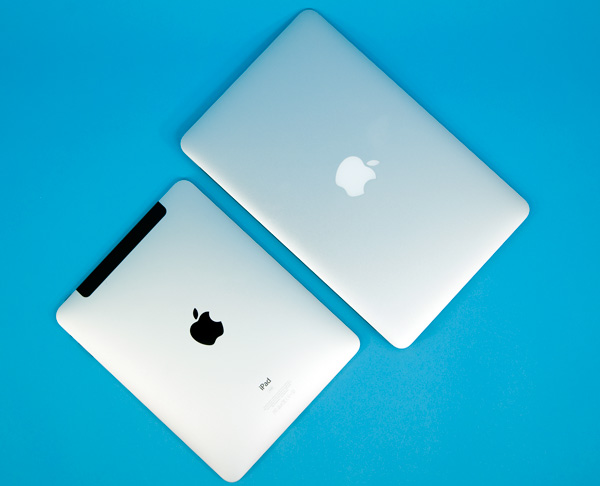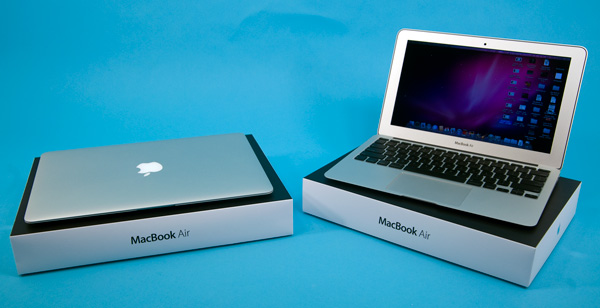Apple's 2010 MacBook Air (11 & 13 inch) Thoroughly Reviewed
by Anand Lal Shimpi on October 26, 2010 10:08 PM EST- Posted in
- Mac
- Apple
- MacBook Air
- Laptops
Final Words
I really like the form factor of the 11-inch MacBook Air. It's great to carry around. It's like an iPad for people who have to get real work done. I just wish it was faster. If Intel made a 32nm Core 2 Duo, clocked high enough the 11 would be perfect. I guess that’s what Atom is eventually supposed to be, but right now the performance is just too low. Intel appears to have been too conservative with Atom. Perhaps Bobcat and ARM’s Cortex A15 will light a fire under Intel's Atom team.
The 11-inch MacBook Air is effectively a $999 netbook from Apple. I call it a netbook because it can do all of the things you could do on a netbook, without any of the performance or quality headaches. You get a great display, a beautiful chassis and much better performance. The problem is that it’s $999.
Granted that’s not all that much more expensive than an iPad with all the trimmings, and much more useful to actually get work done on, but it’s still a lot of money. At $599 or even $699 the 11-inch MacBook Air would be a steal. It would probably do wonders for Apple’s marketshare as well. But at $999 it, like many of Apple’s products, is a luxury item.
For me, I’d have to own the 11-inch, plus a 15-inch MacBook Pro plus my desktop. That’s three machines, plus a smartphone and I’d be set. I’d carry the 11-inch on most business trips, the 15-inch for big shows that I’d have to cover and any heavier work I’d do at home on the desktop. I don’t mind the setup, it’s just a costly setup to have.
Unlike the 11, the 13-inch MacBook Air is far easier to recommend and can actually replace a machine in your arsenal. If you’ve got another machine (e.g. desktop), the 13-inch MacBook Air can easily replace a 13-inch MacBook Pro. You give up some performance but you do get a more portable machine, a higher screen resolution and an SSD for only $100 more than the base MacBook Pro configuration ($200 more if you add the extra 2GB of memory needed to equalize things).
You will get much better battery life on the 13-inch MacBook Pro, but otherwise the Air is actually quite compelling - particularly if you have to carry this thing with you all day. I suspect the decision will be a lot easier once Apple moves the Pro line to Sandy Bridge, but if you’re buying today the race is close.












185 Comments
View All Comments
khimera2000 - Wednesday, October 27, 2010 - link
I love me m11x R2 :D looking at this thing... im happy that its still speedier, and i dont care who you are something as thin as the macbook would freak me the !@#$ out if i droped it... more so then the one i have right now. (mono frame = expensive fix)The0ne - Wednesday, October 27, 2010 - link
"I really like the form factor of the 11-inch MacBook Air. It's great to carry around. It's like an iPad for people who have to get real work done. I just wish it was faster. If Intel made a 32nm Core 2 Duo, clocked high enough the 11 would be perfect. I guess that’s what Atom is eventually supposed to be, but right now the performance is just too low."Essentially this means the 11" MacBook is NOT suitable unless you want to wait and wait. You won't get any "real work done" by any means as it is. So why even bother to praise it and at the same time downgrade it.
A netbook is both usable AND CHEAP. These are not and thus should not be called or even be consider netbooks. That's just crazy talk there. Might as well call all the rest of the ultra light notebooks netbooks.
kmmatney - Wednesday, October 27, 2010 - link
It has an SSD, so no, you don't need to wait and wait. I agree with Anand's review - it is like a netbook in terms of portability, but its much faster, and has a much better screen. It's certainly more usable than the average netbook.KarateBob - Wednesday, October 27, 2010 - link
Good review so far, until you listed the system temperatures in Fahrenheit. I understand Apple lists the temps in (F), but the industry-standard units for temperature reading is Celcius. It's what most enthusiasts can understand. (ie. We 60C is getting hot for a pre-i7 CPU, but I couldn't tell you what 60C is in F)Can you please add Celcius numbers to the review, perhaps next to the Fahrenheit numbers, it will make the article much more comprehensible. Thanks
Sufo - Wednesday, October 27, 2010 - link
I was just about to make this point - good thing i read through the comments before hand heh.I was very very disappointed by the use of F here at all, let alone it being the only scale used. Technical hardware reviews, for me, fall into the realm of science (albeit loosely) and C is the de facto standard in the scientific world (well, at least while it isn't K). Many component monitoring applications do not even have the option to display temps in F, and if they do, it is rarely (if ever) the default selection.
So +1 to the request for at least displaying both numbers in future, and perhaps you could consider dropping F completely as i'd argue it has no context within the world of computing hardware.
Anand Lal Shimpi - Wednesday, October 27, 2010 - link
Temperatures in C as well as F are both present now :)Take care,
Anand
SraCet - Wednesday, October 27, 2010 - link
To the reviewers and many commenters, it is tedious to listen to you divide the world into people who do "real work" and people who just fool around with IM and check Facebook.I do software development and scientific computing and for my purposes, the 11.6" MacBook Air is more than powerful enough.
Reading your review, it sounds like the only things you consider "real work" are editing 12 megapixel photos, doing 3D renders, and (ironically) playing 3D video games.
5 years ago, a 1.4GHz Core 2 Duo would have almost been the fastest CPU money could buy. Are you saying that people only started doing "real work" with their computers sometime in the last 5 years?
Sorry, let me go back to writing code and running simulations, and stop interrupting your "real work"--i.e., resizing your pretty pictures because you took them at 20 times the resolution you actually needed for web publishing.
Sufo - Wednesday, October 27, 2010 - link
"5 years ago, a 1.4GHz Core 2 Duo would have almost been the fastest CPU money could buy. Are you saying that people only started doing "real work" with their computers sometime in the last 5 years?"Well, only if you interpret his comments as suggesting that these tasks are _impossible_ to perform on the 11" MBA. Of course, that would be a gross misinterpretation - as i'm sure you can see. A more relevant extrapolation might be that 5 years ago, performing said tasks was a sluggish and intolerable chore - and on that we probably see eye to eye.
As for the "real work" slur - i can understand your frustration, however you must realise that a large part (probably the largest part) of the non-casual MBA-buying demographic will be people who consider the "real work" of the article as well... "real work" - and you can't get angry at the reviewers for trying to include usage statistics tailored to the people most likely to be buying the device. If anything it is to their credit. Similarly, it is unrealistic to expect them to cover every single usage scenario.
SraCet - Wednesday, October 27, 2010 - link
I suspect a very small percentage of professionals do anything that would stress out a Core 2 Duo. Most people do word processing, spreadsheets, presentations, e-mail. Editing and compiling code (developers). Accessing other computers remotely (IT types). Web browsing for business, like arranging travel. etc. etc.According to the reviewers, and apparently you, all of this stuff can be lumped in with "casual" (your word) use and is not "real work" because it can be done without taxing a dual core 1.4GHz processor.
Sufo - Friday, October 29, 2010 - link
Ah, you've somewhat misinterpreted me here - the term "non-casual" was merely meant to identify people who use their machine for work purposes. Perhaps i should have used "professional". My overall point (as misguided as it may be) was really only alluding to the generalisation that most people who buy macs are artsy, journalist types - for whom editing pictures and obscenely flash-heavy websites etc is their normal, "real" workload. And yes, i realise this thread is dead :)